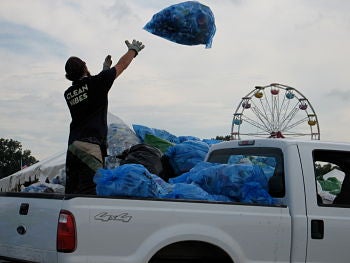
Most of the 70,000 ticketed music lovers are already motoring across the country in their cars, RVs, and minibuses to make it to Manchester, Tennessee in time for Bonnaroo Music Festival’s largest opening act tonight, ‘The Dodos. Despite the carbon footprint they will have left in their tracks, once attendees arrive on the 700-acre farm where the festivities are being held, the four day concert is going to be a green affair. Building on eco-friendly efforts over the past eight years since Bonnaroo’s inception, the festival’s organizers—Superfly Prodcutions and AC Entertainment—are pulling out even more stops this year to dampen the festival’s environmental impact.
This year the organizers have hired vendors to sell local food, incorporated renewable energy wherever possible, and plan on limiting the number of bottled water sales. Bands will rock out on a solar-powered stage, and a system of wells will provide water free of charge. Those who tear themselves away from the near non-stop music can watch demonstrations and take classes on cultivating and harvesting produce in a “Victory Garden.” Participants will also be developing the skills needed to practice composting, which will be taught at Bonnaroo’s official compost pile—one that has tripled in size over these past few years.
“Every year we try to take little steps on improving the existing green programs we have, and take big ones in starting up new ones,” says Laura Sohn, the sustainability coordinator for Superfly Productions, who has been working on the Bonaroo music festival for four years. For the ninth year in a row, Superfly has contracted the event waste and recycling group, ‘Clean Vibes,’ which recruits an army of five to six hundred volunteers to help in the effort. This year many of them, dubbed “trash talkers,” will be helping patrons divert recyclable materials and trash into their proper receptacles in the area known as Centeroo.
Divided into different temporary villages to make the sea of cars, tents, and stages more navigation friendly, Bonnaroo will host many of the green programs--including First World Trash, a bin where unwanted tents will be gathered up and repurposed into tote bags for next year's Bonnaroo —in the village known as Planet Roo. This village will also house booths laden with information on Non-Governmental Organizations whose goals include ‘making the world a better place’ through the preservation of natural resources.
In 2007, Bonnaroo bought the farm land where the festival is held, so it’s also begun to incorporate more permanent changes, such as replacing gas powered generators with a direct connection to the local Duck River power grid—thereby nearly eliminating the festival’s need for biodiesel fuel—and working to install permanent solar power panels.
Its green practices have lead Bonnaroo to be one of 14 recipients of this year’s Government’s Environmental Stewardship award. But it’s not just Bonnaroo taking strides to make green adjustments. “Many festivals are pushing themselves to leave less impact,” says Sohn, “and fans are becoming more aware in terms of what they can do to help.”
To hear free song recordings from past Bonnaroo festivals and send a letter to your senator calling for new climate change legislation, visit
musicforaction.org.


